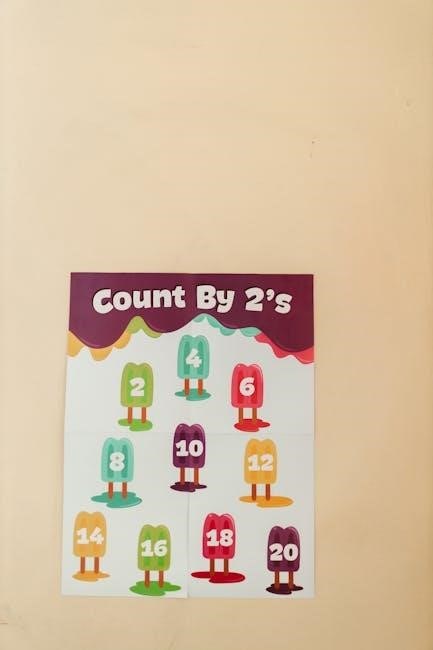The 12 and 12 Step 3 PDF serves as a comprehensive guide for understanding and working through Step 3 of the 12-Step program. It provides detailed insights into the decision to turn one’s will and life over to a Higher Power, offering practical tools and reflections for spiritual growth. This resource is essential for individuals seeking to deepen their recovery journey and align their actions with the principles of the 12-Step program.
Overview of the 12 and 12 Program
The 12 and 12 program, also known as the “Twelve and Twelve,” is a foundational guide for recovery that complements the original 12 Steps of Alcoholics Anonymous. Published in 1953, it provides detailed interpretations of each Step and Tradition, offering practical advice for personal growth and spiritual transformation. The program is designed to help individuals understand and apply the principles of recovery in their daily lives. Each chapter focuses on a specific Step or Tradition, making it a valuable resource for newcomers and seasoned members alike. The program emphasizes spiritual growth, accountability, and the importance of community in achieving long-term sobriety.
Importance of Step 3 in the 12-Step Process

Importance of Step 3 in the 12-Step Process
Step 3 is a pivotal moment in the 12-Step journey, marking the transition from introspection to action. It invites individuals to make a conscious decision to turn their will and lives over to a Higher Power, fostering spiritual reliance. This step is crucial as it shifts focus from self-centeredness to a deeper connection with a divine authority. By surrendering ego and control, participants often experience profound relief and renewed purpose. Step 3 lays the groundwork for subsequent steps, enabling individuals to embrace humility and trust, which are essential for sustained recovery and personal transformation. Its principles are explored in-depth in the 12 and 12 Step 3 PDF, providing guidance and reflection for those navigating this critical phase.

Understanding Step 3 of the 12 and 12
Step 3 involves a decision to turn one’s will and life over to a Higher Power, emphasizing faith and spiritual reliance, crucial for recovery and central to the 12-Step process.
The Decision: Turning Will and Life Over to God
Making the decision to turn one’s will and life over to God is a cornerstone of Step 3. This step requires a conscious choice to surrender control, fostering humility and trust in a Higher Power. It involves letting go of self-reliance and embracing spiritual guidance, which is vital for recovery. By surrendering, individuals open themselves to divine care, aligning their actions with a greater purpose. This decision marks a significant shift from self-centeredness to a faith-centered approach, enabling personal growth and spiritual transformation. The act of surrender is not passive but a proactive commitment to seeking God’s will in daily life.
Action Required: Placing Faith in a Higher Power
Action in Step 3 involves surrendering self-will and placing faith in a Higher Power. This requires proactive engagement, such as prayer, meditation, and seeking spiritual guidance. By letting go of control, individuals open themselves to divine care, fostering humility and trust. Continuous action is essential, as Step 3 is not a one-time decision but a ongoing commitment to spiritual growth. This step encourages individuals to align their actions with a Higher Power’s will, promoting personal transformation and sobriety. It emphasizes the importance of spiritual practices in maintaining faith and reliance on a power greater than oneself.
Solution: Understanding God’s Will and Care
The solution in Step 3 lies in understanding and trusting God’s will and care. This step involves letting go of self-reliance and embracing the belief that a Higher Power is actively working in one’s life. By surrendering, individuals gain clarity on their purpose and direction. The solution is not about achieving perfection but about fostering a deeper connection with God. Through prayer and meditation, one can better understand God’s will, leading to a sense of peace and reliance on divine care. This step emphasizes the transformative power of faith and trust in a Higher Power, essential for lasting sobriety and spiritual growth.

Key Principles of Step 3
Step 3 emphasizes action, spiritual growth, and reliance on a Higher Power. It shifts focus from reflection to active surrender, fostering a mindset of trust and divine guidance.
Shifting Mindset from Reflection to Action
Step 3 marks a critical transition from introspection to proactive engagement with spiritual principles. It encourages individuals to move beyond self-reflection and take decisive action by surrendering their will and life to a Higher Power. This shift requires trust and faith, enabling individuals to let go of self-reliance and embrace divine guidance. By aligning actions with spiritual beliefs, participants cultivate a deeper connection to their Higher Power, fostering personal growth and spiritual development. This mindset change is essential for progressing in the 12-Step journey, as it lays the foundation for continuous action and long-term sobriety.
Continuous Action and Spiritual Growth
Step 3 emphasizes the importance of continuous action and spiritual growth in the recovery process. By turning one’s will and life over to a Higher Power, individuals commit to a journey of ongoing spiritual development; This step requires daily practice, including prayer, meditation, and service to others, to maintain alignment with divine guidance. Through consistent effort, participants experience personal transformation, enhanced moral awareness, and a stronger sense of purpose. Continuous action ensures that spiritual growth remains a dynamic and evolving process, fostering resilience and reinforcing sobriety. This commitment to spiritual principles is vital for sustained recovery and a fulfilling life.
Role of Sponsorship in Step 3
Sponsorship plays a vital role in Step 3, offering guidance and support as individuals surrender their will and life to a Higher Power. Sponsors share their experiences, helping newcomers understand the spiritual principles and practical application of Step 3. They provide encouragement, accountability, and insight, fostering a deeper connection to the 12-Step program. Through sponsorship, individuals gain clarity on their Higher Power’s role and learn to navigate challenges with humility and faith. This mentorship not only strengthens spiritual growth but also reinforces the commitment to continuous action and recovery, making sponsorship an indispensable asset in working Step 3 effectively.

Resources for Working Step 3
Free Step 3 worksheets in PDF and DOC formats are available, along with workbooks and online study guides to assist in understanding and applying the principles of Step 3 effectively.
Free Step 3 Worksheets in PDF and DOC Format
Free Step 3 worksheets in PDF and DOC formats are widely available for individuals working through the 12-Step program. These downloadable resources provide structured questions and prompts to guide personal reflection and action. They are designed to help individuals understand the principles of Step 3, such as surrendering to a Higher Power and aligning their will with spiritual guidance. The worksheets are adaptable to various 12-Step programs, including AA, NA, and OA, making them a versatile tool for recovery. By using these worksheets, individuals can deepen their understanding of Step 3 and apply its teachings effectively in their daily lives.
Twelve Steps and Twelve Traditions Online Study
The Twelve Steps and Twelve Traditions book is available online, offering a detailed exploration of each Step and Tradition. This resource provides a comprehensive guide for personal recovery and group discussions. Chapters are accessible in PDF format, allowing individuals to study at their own pace. The online material includes reflections on Step 3, emphasizing the decision to turn will and life over to a Higher Power. This study guide is invaluable for deepening understanding of the 12-Step program and fostering spiritual growth. It is widely used by AA, NA, and other 12-Step fellowships to enhance recovery journeys.
Workbooks and Guides for Step-by-Step Recovery
Various workbooks and guides are available to support individuals working through Step 3 of the 12-Step program. These resources include printable PDF and DOC worksheets designed for AA, NA, and other fellowships. They offer structured questions and exercises to facilitate reflection and action. Companion guides like “Steps by the Big Book” provide additional insights and practical advice based on personal experiences. These materials help individuals align their will with a Higher Power and deepen their spiritual connection. Workbooks are invaluable tools for systematic recovery, ensuring a thorough understanding and application of Step 3 principles.

Spiritual Aspects of Step 3
Step 3 emphasizes reliance on a Higher Power, fostering faith and surrender. It encourages spiritual growth through trust in divine care, promoting a deeper connection with God.
Faith and Surrender in the 12-Step Program

Faith and surrender are central to Step 3, guiding individuals to trust a Higher Power. This step involves letting go of self-control, fostering humility and reliance on divine guidance. By surrendering, one opens up to spiritual transformation, a key element in recovery. Faith becomes the foundation for this process, enabling individuals to embrace the program’s principles and find peace in their journey toward sobriety and personal growth. This shift from self-reliance to spiritual dependence is crucial for lasting change and inner healing within the 12-Step framework.
Concept of Higher Power in Step 3
The concept of a Higher Power in Step 3 is a cornerstone of the 12-Step program, emphasizing reliance on a force greater than oneself. This Power is not necessarily religious but a personal interpretation of a divine or spiritual entity. Step 3 encourages individuals to surrender self-will, fostering humility and trust in this Higher Power. By letting go of ego and control, participants open themselves to spiritual transformation and guidance. The concept is inclusive, allowing individuals to define their Higher Power in a way that resonates with their beliefs, making the step accessible and meaningful for diverse backgrounds and faiths.
Confession and Fearless Admission of Wrongs
Confession and fearless admission of wrongs are central to the recovery process, particularly in Step 3. This step involves acknowledging and confronting past mistakes honestly, which fosters humility and spiritual growth. The 12 and 12 Step 3 PDF emphasizes the importance of surrendering self-will and ego, allowing individuals to take responsibility for their actions. By admitting wrongs without fear, participants open themselves to divine guidance and liberation from guilt. This principle aligns with the broader 12-Step philosophy, encouraging accountability and moral integrity as foundational elements of sobriety and personal transformation;

Personal Growth and Recovery Through Step 3
Step 3 fosters personal growth by shifting focus from self-reliance to spiritual dependence, encouraging a deeper connection with a Higher Power for sustained sobriety and transformation.
Mindset Shift from Self-Reliance to Spiritual Dependence
Step 3 emphasizes transitioning from self-reliance to spiritual dependence, encouraging individuals to surrender their will to a Higher Power. This shift involves letting go of control and embracing faith, fostering humility and openness. It challenges the ego and self-centeredness, replacing them with trust in a divine plan. Practicing Step 3 helps individuals recognize their limitations and align their actions with spiritual principles. This mindset change is crucial for lasting recovery, as it reduces self-will and increases reliance on a Higher Power, promoting inner peace and purpose. The shift is not a one-time event but a continuous process of spiritual growth and surrender.
Building a Relationship with a Higher Power
Step 3 guides individuals in establishing a meaningful connection with a Higher Power, fostering trust and reliance. This relationship is foundational for spiritual growth and recovery. By surrendering self-will, individuals open themselves to divine guidance, allowing their actions to align with a greater purpose. Prayer, mindfulness, and reflection are key practices that strengthen this bond, helping individuals cultivate faith and humility. Building this relationship transforms self-centeredness into a dependence on spiritual principles, providing comfort and direction in life’s challenges. This connection is not static but evolves through continuous effort, becoming a cornerstone of lasting sobriety and personal transformation.
Transformative Power of Step 3 in Sobriety
Step 3 holds profound transformative power, reshaping lives by fostering spiritual awakening and self-awareness. By surrendering self-will and trusting a Higher Power, individuals experience a shift from self-centeredness to a life of purpose and meaning. This step cultivates humility, reducing ego-driven behaviors and fostering inner peace. The act of turning one’s life over to a Higher Power creates a foundation for lasting sobriety, as it replaces fear and control with faith and trust. Step 3’s transformative power lies in its ability to empower individuals to embrace change, leading to a deeper connection with their spiritual selves and a more fulfilling life.

12 and 12 Traditions
The 12 and 12 Traditions ensure group unity and guide individual behavior, fostering anonymity, humility, and service. They are vital for maintaining the integrity of the 12-Step program.
Alignment of Step 3 with 12 Traditions
Step 3 aligns with the 12 Traditions by emphasizing spiritual principles like anonymity, humility, and service. It promotes selflessness and trust in a Higher Power, mirroring Tradition 12’s focus on spiritual growth. By surrendering personal control, individuals embrace the group’s primary purpose, reflecting Tradition 5. This step also aligns with Tradition 2, trusting divine guidance over human leadership, fostering unity and collective recovery. Thus, Step 3 supports the Traditions, ensuring harmony between personal spiritual growth and group principles.
Importance of Anonymity and humility
Importance of Anonymity and Humility
Anonymity and humility are cornerstone principles in the 12-Step program, particularly in Step 3. Anonymity ensures that individuals focus on spiritual growth rather than personal recognition, fostering a sense of equality and unity within the group. Humility, as emphasized in Step 3, involves surrendering self-will and acknowledging the need for a Higher Power. These principles create a safe, non-judgmental environment where members can openly share their struggles and progress. By embracing anonymity and humility, individuals cultivate a deeper commitment to their recovery and the broader fellowship, aligning their actions with the program’s core values and traditions.
Role of Service in Step 3
Service plays a vital role in Step 3 by fostering spiritual growth and reinforcing the decision to turn one’s life over to a Higher Power. Engaging in service helps individuals apply the principles of Step 3 actively, deepening their commitment to recovery. Through acts of service, participants practice humility and selflessness, which are essential for spiritual progress. Service also strengthens the connection with the Higher Power, aiding in the continuous action required for sobriety. By serving others, individuals not only support their own recovery but also contribute to the broader community, embodying the spirit of the 12-Step program.

Benefits and Challenges of Step 3
Step 3 offers profound benefits, including peace of mind, spiritual growth, and sobriety. Challenges arise from overcoming ego and self-will, requiring trust in a Higher Power.
Peace of Mind and Sobriety Through Step 3
Step 3 brings profound peace of mind by shifting focus from self-reliance to spiritual dependence. Surrendering will and life to a Higher Power fosters inner calm and clarity. This step helps individuals release control, embracing faith and trust in a power greater than themselves. The act of letting go alleviates anxiety and guilt, paving the way for lasting sobriety. By aligning actions with spiritual principles, individuals experience a transformative sense of freedom and purpose. Step 3 is a cornerstone of recovery, offering a pathway to serenity and long-term emotional well-being.
Common Challenges in Practicing Step 3
One common challenge in practicing Step 3 is the difficulty in fully surrendering to a Higher Power, especially for those with limited spiritual experience. Many struggle with trusting an unseen force, fearing loss of control. Others may resist the idea of divine will due to past traumas or rigid beliefs. Additionally, understanding one’s true will versus self-will can be confusing, leading to hesitation. Some may also feel disconnected from their Higher Power, doubting its presence or care. These challenges highlight the need for guidance, reflection, and patience to build faith and trust in the process.
Overcoming Ego and Self-Will
Overcoming ego and self-will is crucial in Step 3, as these tendencies often hinder spiritual progress. The ego’s insistence on control can block the ability to surrender to a Higher Power. Self-will, driven by personal desires, may lead to resistance against divine guidance. Recognizing these patterns is the first step toward change. Through humility and self-reflection, individuals can gradually let go of their need to control outcomes. Surrendering self-will allows for a deeper connection with a Higher Power, fostering spiritual growth and alignment with God’s plan. This process requires patience and consistent effort to shift from self-reliance to spiritual dependence.
The 12 and 12 Step 3 PDF emphasizes the transformative power of surrendering self-will to a Higher Power, fostering spiritual growth and lasting sobriety through this pivotal step.
Step 3 marks a pivotal transition from self-reliance to spiritual dependence, emphasizing the decision to surrender one’s will and life to a Higher Power. This step encourages individuals to shift from reflection to action, fostering humility and faith. By aligning with a Higher Power’s care, participants experience spiritual growth and a foundation for lasting sobriety. The significance lies in its transformative power, enabling individuals to embrace a new way of life rooted in trust and reliance on a greater force, making it a cornerstone for the 12-Step journey and subsequent recovery.
Final Thoughts on the 12 and 12 Program
The 12 and 12 program offers a profound framework for personal transformation and sobriety, with Step 3 serving as a cornerstone of spiritual growth. By guiding individuals to surrender their will to a Higher Power, the program fosters humility, faith, and continuous action. The resources, such as the Step 3 PDF, provide practical tools for working through each stage, ensuring a comprehensive approach to recovery. Ultimately, the program’s emphasis on spiritual principles and community support creates a lifelong path to healing and fulfillment, making it an invaluable resource for those seeking lasting change and inner peace.

